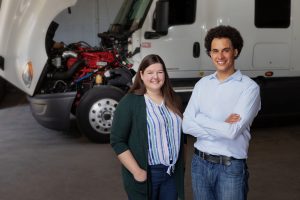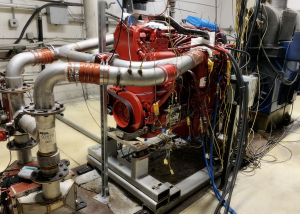ClearFlame Engine Technologies, a Chain Reaction Innovations (CRI) startup dedicated to development of net-zero engine technology, recently secured $17 million in Series A financing to support commercialization of the company’s innovative engine technology for the long-haul trucking, agriculture and power generation sectors.
The financing was led by Breakthrough Energy Ventures, a public-private non-profit partnership established by Bill Gates and a coalition of private investors. Other funders included Mercuria, John Deere and Clean Energy Ventures.
CRI is a U.S. Department of Energy lab-embedded entrepreneurship program located at Argonne.

While embedded at Argonne as part of CRI’s first cohort of innovators, ClearFlame’s co-founders, Julie Blumreiter and B.J. Johnson, worked with Doug Longman – section manager of engine combustion research in Energy Systems – as their principal investigator.
Their goal was to develop a heavy-duty engine that replaced diesel fuel to eliminate pollutants and emissions and decarbonize. The result was a unique engine technology that enables low-carbon, renewable fuels such as ethanol to be integrated into existing diesel engine platforms, offering a lower-emission, lower-cost solution than diesel fuel.
Longman said, “It was a great experience working with ClearFlame through the CRI program, as they energized our lab with their entrepreneurial spirit and enthusiasm. Being part of the first CRI cohort, we had to first learn how we could help them quickly move toward commercializing their technology while also bringing value to our research programs.” He went on to point out, “They were able to bring one of our experimental engine setups back on line after a program ended and was inactive, and we partnered with them on several new proposals. Some of the computational collaborations continue today as a result of those awards.”

A key aspect of the two-year CRI program is the pairing of visiting innovators with a host Argonne PI. Not only do the innovators gain the perspective of an expert in their particular field, but in many instances, the host PIs benefit as well. Longman noted, “We expect our relationship to continue as collaborators with Julie and B.J. as their business drivers and our research interests align in the decarbonized combustion world of the future.”
Other CRI PIs have noted that working with early-stage innovators can spur them to think of their own core research areas in new ways. In some cases, these relationships have led to connections that have benefitted a PIs core research.
“Argonne scientists are a key aspect of CRI,” said John Carlisle, CRI’s Director. “They offer guidance and mentoring that informs the path of our cohorts.” Carlisle also noted that the success of many CRI startups can be traced in part back to their PIs.
“We hear time and again that access to the world-class Argonne facilities and scientists are a huge incentive to applying for the program,” Carlisle said.
CRI closed applications for its newest cohort on Oct. 31 and is currently seeking Argonne PIs for the yet-to-be-selected group that will enter the program in June 2022. For more information contact Deena Wright, [email protected].
###

